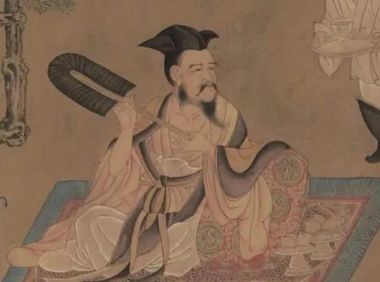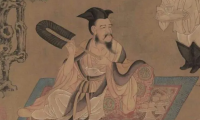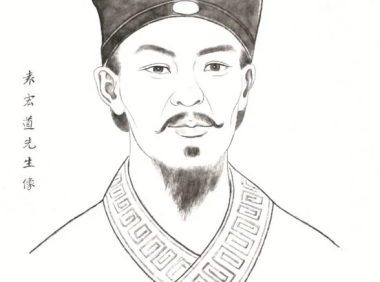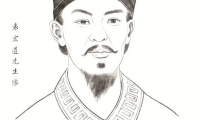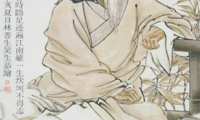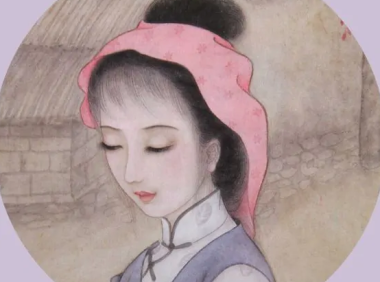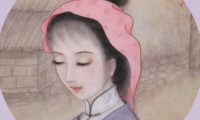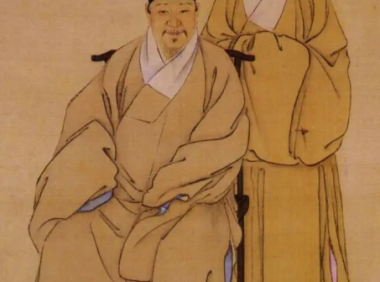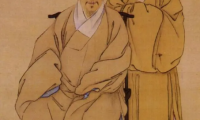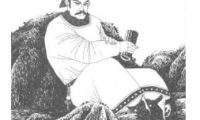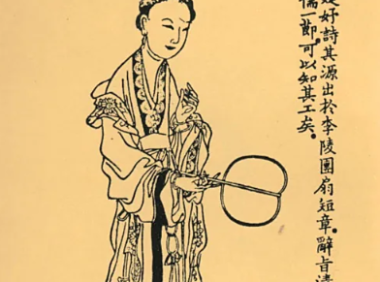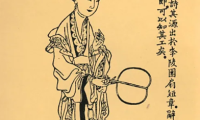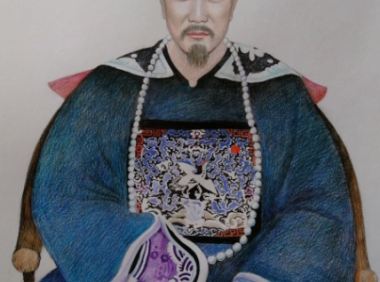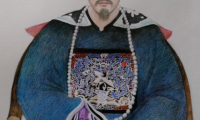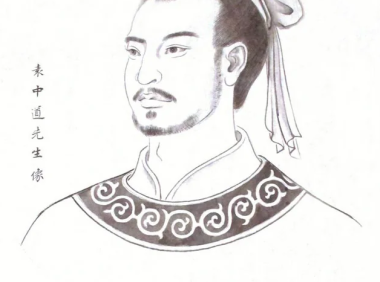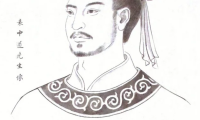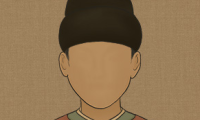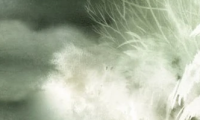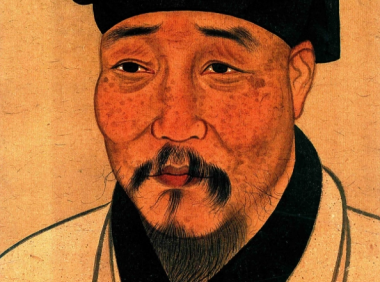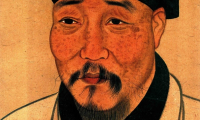-
Ruan Ji: Meditations
咏怀·其三 阮籍 嘉树下成蹊,东园桃与李。 秋风吹飞藿,零落从此始。 繁华有憔悴,堂上生荆杞。 驱马舍之去,去上西山趾。 一身不自保,何况恋妻子。 凝霜被野草,岁暮亦云已。 Meditations Ruan Ji III There are trodden paths under lovely trees— The peaches and plums in gardens in the east. When bean leaves drift about in autumn breeze. The leaves begin to fall as life has ceased. The pretty blossoms too have had their day; The mighty mansions someday will be still. I’ll ride a horse and soon be on my way To live alone beneath the Western Hill. It’s hard enough to keep me safe and sound And harder still to protect my wife and child. When chilly frost hits grass upon the ground, The year will bring an end to things grown wild. (汪榕培 译) III Under the beautiful trees paths have formed, in the Eastern Garden—peaches, plum trees, bean-leaves flying everywhere, in Autumn wind. But from now on, everything withers and dies. Blossoming flowers will one day shrivel, Thorns and weeds will sprout in the courtyard. Time to mount my horse, to leave it all, and head for the Western Hills: when you can’t be sure of your own security how can you care for your wife and children? Frost thickens the wild grass. The year grows old—there’s no more…...
- 0
- 0
- 96
-
Ruan Ji: Meditations
咏怀·其五 阮籍 平生少年时,轻薄好弦歌。 西游咸阳中,赵李相经过。 娱乐未终极,白日忽蹉跎。 驱马复来归,反顾望三河。 黄金百镒尽,资用常苦多。 北临太行道,失路将如何。 Meditations Ruan Ji V Gone are the days when I was fresh and young; I was indulged in nightly dance and song. When I went west to the capital Xianyang, I teased the pretty maidens all day long. Before I fully tasted all the fun, I found that I had passed my prime of life. Now that a new life for me has begun, I look back at the region full of strife. As I have squandered all my gold, I’m always worrying about my cost. Like the man who takes a mistaken road, What am I to do since I’ve got lost? (汪榕培 译) V I remember when I was young at heart, I paid no heed, singing and playing. Off I went westward to Xianyang, the capital, there to tease the women, flirt with the rich. All this pleasure was still at its height when suddenly, night-time fell. Now I return, on horseback, and gaze across the far reaches of Three Rivers. Hundreds of yi of gold may have been wasted— never mind. We suffer from too much wealth. Before me the road runs away to the north; how can…...
- 0
- 0
- 80
-
Ruan Ji: Meditations
咏怀·其四 阮籍 天马出西北,由来从东道。 春秋非有托,富贵焉长保。 清露被皋兰,凝霜沾野草。 朝为美少年,夕暮成丑老。 自非王子晋,谁能常美好。 IV The heavenly horse comes galloping out of the Northwest, and on it gallops, along the Eastern Road. Spring and Autumn come and go, but tell me— How can fortune be retained? At dawn, the violets shine with dew in the marsh, the frost clusters, saturating the grass. He who is young and handsome in the morning is ugly and old when evening falls. Prince Jin with his flute which sang like a phoenix flew, flew on a crane, to the peak of Immortal Mountain! But I am not him, who is forever beautiful. (吴伏生、Graham Hartill 译)...
- 0
- 0
- 68
-
Yuan Hongdao: Letter to Qiu Chang-ru
与丘长孺书 袁宏道 闻长孺病甚,念念。若长孺死,东南风雅尽矣,能无念耶?弟作令备极丑态,不可名状。大约遇上官则奴,候过客则妓,治钱谷则仓老人,谕百姓则保山婆。一日之间,百暖百寒,乍阴乍阳,人间恶趣,令一身尝尽矣。苦哉!毒哉! 家弟秋间欲过吴。虽过吴,亦只好冷坐衙斋,看诗读书,不得如往时,携侯子登虎丘山故事也。 近日游兴发不?茂苑主人虽无钱可赠客子,然尚有酒可醉,茶可饮,太湖一夕水可游,洞庭一块石可登,不大落寞也。如何? Letter to Qiu Chang-ru Yuan Hongdao I’ve been very concerned since I heard how sick you’ve been. If you should die, all the grace and culture of the Southeast will be gone. Can I help being concerned? As a county magistrate, I’ve had to play the most hateful roles—they are indescribable. To give you a general idea: when I chance to meet a superior official, I’m a slave; when I entertain a guest who has dropped by, I’m a courtesan; when I manage money or grain, I’m a warehouse supervisor; when I explain things to the peasantry, I’m an old lady matchmaker. In the course of a single day, things blow hot and cold a hundred times now bright and active, now dark and passive—the county magistrate experiences all the worst qualities of the everyday world. It’s painful and it’s like poison to me. My brother was going to pass through Wu last autumn, and though he did pass through, he just wanted to sit around in the county office library reading books and poems, and we didn’t get to go climb Tiger Hill as we had before with Mr. Hou. Have you felt much…...
- 0
- 0
- 60
-
Sun Kuang-hsien: “Spirit of the Yellow River” (Ho-tu Shen)
河渎神·其二 孙光宪 江上草芊芊, 春晚湘妃庙前。 一方卵色楚南天, 数行斜雁联翩。 独倚朱阑情不极, 魂断终朝相忆。 两桨不知消息, 远汀时起鸂鶒。 “Spirit of the Yellow River” (Ho-tu Shen) Sun Kuang-hsien 2 The grass on the river bank is fresh green. It is late spring by the shrine of the Hsiang-fei. The southern sky of Ch’u is a pale-colored strip of blue. The wild geese soar across in slanting formations. Alone I lean on a vermilion railing, my feelings endless. My heart is breaking with memory all the day long. There is no sign of oars bringing a boat this way. Wild ducks hover in the air on a distant sand bar. (Lois Fusek 译)...
- 0
- 0
- 78
-
Sun Kuang-hsien: “Spirit of the Yellow River” (Ho-tu Shen)
河渎神·其一 孙光宪 汾水碧依依, 黄云落叶初飞。 翠娥一去不言归, 庙门空掩斜晖。 四壁阴森排古画, 依旧琼轮羽驾。 小殿沉沉清夜, 银灯飘落香灺。 “Spirit of the Yellow River” (Ho-tu Shen) Sun Kuang-hsien 1 The green water of the Fen flows on and on. Scattered leaves fly up among the twilight clouds. She left trailing azure plumes, giving no date of return. The gate to the shrine is shut to the setting sun. In the eerie gloom, ancient paintings cling to the walls. Even then, her feathered chariot was jade-wheeled. A silent chill darkness descends on the sanctuary. A tiny flame in the silver lamp flickers and dies. (Lois Fusek 译)...
- 0
- 0
- 73
-
Sun Kuang-hsien: “Deva-like Barbarian” (P’u-sa Man)
菩萨蛮·其一 孙光宪 月华如水笼香砌, 金镮碎撼门初闭。 寒影堕高檐, 钩垂一面帘。 碧烟轻袅袅, 红战灯花笑。 即此是高唐, 掩屏秋梦长。 “Deva-like Barbarian” (P’u-sa Man) Sun Kuang-hsien 1 Bright moonlight floods the steps like a cascade of water. The golden knocker clatters when the door is being closed. Chill shadows fall from the topmost eaves. The curtain is trailing loose on its hook. A smoky mist of azure softly curls around. The red candle flame shakes with laughter. So this is what Kao-t’ang is really about. The screen conceals her long autumn dream. (Lois Fusek 译)...
- 0
- 0
- 75
-
Chang K’o-chiu: Tune: “Traveler Welcoming the Immortal”
迎仙客·括山道中 张可久 云冉冉, 草纤纤, 谁家隐居山半崦。 水烟寒, 溪路险。 半幅青帘, 五里桃花店。 Tune: “Traveler Welcoming the Immortal” Chang K’o-chiu Clouds seen and unseen. Grass thin and green. Whose house hidden half up the hill? Smoke-water’s chill. Path along the stream full of peril. Half a curtain green. Five-mile Petal Inn. (Wai-lim Yip 译)...
- 0
- 0
- 68
-
He Shuangqing: Fenghuangtai shang yi chuixiao: Fading Lamp
凤凰台上忆吹箫·残灯 贺双卿 已暗忘吹, 欲明谁剔? 向侬无焰如萤。 听土阶寒雨, 滴破残更。 独自恹恹耿耿, 难断处、 也忒多情。 香膏尽, 芳心未冷, 且伴双卿。 星星。 渐微不动, 还望你淹煎, 有个花生。 胜野塘风乱, 摇曳渔灯。 辛苦秋蛾散后, 人已病、 病减何曾? 相看久, 朦胧成睡, 睡去还惊。 Fenghuangtai shang yi chuixiao: Fading Lamp He Shuangqing Already dimming I forget to blow on it; Were it to shine brightly, who would trim it? Flameless in front of me, glowing like a firefly. I listen to the cold rain on the earthen steps Dripping through the third night watch, Alone by myself, sick and sleepless. Hard to extinguish You too are excessive in feeling. The scented oil is finished, But your fragrant heart has not cooled, Do keep company with Shuangqing for a while. Star after star Gradually fades into motionlessness. But I hope you will suffer through, And then blossom forth again. You will surpass those fishing lamps swaying In the chaotic wind on the wild pond. When autumn’s hard-working moths scatter, I am already ill, And when has my illness ever diminished? Long we watch each other, Vaguely sleep comes upon me… From sleep I am startled awake again. (Grace S. Fong 译)...
- 0
- 0
- 72
-
He Shuangqing: Chun cong tian shang lai: Taking Food to Do Spring Plowing
春从天上来·饷耕 贺双卿 紫陌春情, 漫额裹春纱, 自饷春耕。 小梅春瘦, 细草春明。 春田步步春生。 记那年春好, 向春燕、 说破春情。 到于今, 想春笺春泪, 都化春冰。 怜春痛春春几? 被一片春烟, 锁住春莺。 赠与春侬, 递将春你, 是侬是你春灵。 筭春头春尾, 也难筭、 春梦春醒。 甚春魔, 做一场春梦, 春误双卿! Chun cong tian shang lai: Taking Food to Do Spring Plowing He Shuangqing Purpled paths bright in spring weather. Slowly I tie a spring gauze on my head, And eat by myself during spring plowing. The small plum tree is thin in spring, Fine blades of grass glisten in spring. At each step along the fields spring comes to life. I remember that year in a fine spring To a spring swallow I blurted out spring feelings. And now, I think spring letters and spring tears Have all melted with the spring ice. I cherish spring, dote on spring for how many more springs? By an expanse of spring mist The spring oriole is locked in. You present gifts to a springtime me, And I offer presents to a springtime you: Am I or are you the spirit of spring? You can count the start and end of spring, But it will be hard to tell my spring awakenings from spring dreams. (Grace S. Fong 译)...
- 0
- 0
- 68
-
He Shuangqing: Xi huanghua man: A Stray Wild Goose
惜黄花慢·孤雁 贺双卿 碧尽遥天, 但暮霞散绮, 碎剪红鲜。 听时愁近, 望时怕远, 孤鸿一个, 去向谁边? 素霜已冷芦花渚, 更休倩、 鸥鹭相怜。 暗自眠, 凤凰纵好, 宁是姻缘! 凄凉劝你无言。 趁一沙半水, 且度流年。 稻梁初尽, 网罗正苦, 梦魂易警, 几处寒烟。 断肠可似婵娟意, 寸心里, 多少缠绵! 夜未闲, 倦飞误宿平田。 Xi huanghua man: A Stray Wild Goose He Shuangqing Emerald spreads to the end of the distant sky, Only rosy dusk clouds scattering their fine silk Snipped into fragments of fresh red. When I listen, I worry that it’s so nearby, When I gaze, I dread its being far away: One lone wild goose To whom can it turn? White frost has already chilled the sandbar’s reed flowers, So don’t even ask the gulls and egrets for sympathy. In the dark, sleep alone. Though the phoenix may be fine, When is there ever a bond with it? Mournful, I have no words to encourage you; Go along a sandy shore or halfway up a stream Just to pass the fleeting years. With the rice grains recently exhausted, The fowler’s nets cannot wait; Your dream-soul is easily frightened Many times in the cold mist. Is your grief like a woman’s? In that tiny heart there is so much tender attachment. The night is not yet quiet, Yet, tired from flight, you make the mistake…...
- 0
- 0
- 67
-
He Shuangqing: Mo yu’r: Thanking the Neighbor Girl Han Xi for Her Gift of Food
摸鱼儿·谢邻女韩西馈食 贺双卿 喜初晴, 晚霞西现, 寒山烟外青浅。 苔纹干处容香履, 尖印紫泥犹软。 人语乱, 忙去倚、 柴扉空负深深愿。 相思一线, 向新月搓圆; 穿愁贯恨, 珠泪总成串。 黄昏后, 残热犹怜细喘。 小窗风射如箭。 春红秋白无情艳, 一朵似侬难选。 重见远, 听说道, 伤心已受殷勤饯。 斜阳刺眼, 休更望天涯, 天涯只是, 几片冷云展。 Mo yu’r: Thanking the Neighbor Girl Han Xi for Her Gift of Food He Shuangqing Cheered by the end of the rains, The evening clouds in the west appear; Beyond the haze the chilly mountains look light blue. Where strips of moss are dry, fragrant shoes can tread. Sharp prints stay on the purplish mud still soft. Clamor of people’s voices: I rush to go lean on the brushwood door vainly harboring deep deep desire. My thoughts of you are all one strand Spun from the new moon to the full, Threaded with grief, strung with remorse, pearls of tears enough for one whole string. After dusk, still warm and damp, Who will sustain my struggle to breathe? Through the small window the wind shoots in like an arrow; Springtime red, autumn white, heartless beauty; Difficult to pick a bud like me. Our next meeting is so far off. I hear the heartbroken one Has already received her lavish feast. The sunset hurts the eyes; Don’t look to the horizon, The horizon only shows…...
- 0
- 0
- 57
-
Xia Wanchun: Farewell to Yunjian
别云间 夏完淳 三年羁旅客,今日又南冠。 无限河山泪,谁言天地宽? 已知泉路近,欲别故乡难。 毅魄归来日,灵旗空际看。 Farewell to Yunjian1 Xia Wanchun Three years I’ve been a warrior on the move, Only to wear a captive’s cap today!With endless tears for my native land and sea, Who says there’s wide space ‘twixt Heav’n and Earth? Nay! Already I know to me Hades is near, And yet ‘tis hard to part with homeland dear! The day my staunch soul here again comes by, I wish our combat flags’ll be flying high! 1. Yunjian was the name of Songjiang County, Jiangsu Province, near Shanghai. Xia was a native there. (王知还 译) Adieu, My Homeland Xia Wanchun1 I struggled three long years, Captive again today. My land’s worth bitter tears. Could I come homeward way? I know my death is near; It’s hard to leave my land. See when my soul comes here, I’ll wave my flag in hand. 1. The poet carried out anti-Manchurian activities at the age of fifteen and was put to death at seventeen. (许渊冲 译) Farewell to Yunjian Xia Wanchun Three years in a strange land And I end, here, in prison. Hot tears flow endlessly For our own land, endlessly dear. Oh, all I have left of this beloved, lovely…...
- 0
- 0
- 82
-
Liu Chih: Tune: “Sheep on the Mountain Slope”
山坡羊 刘致 朝朝琼树, 家家朱户, 骄嘶过沽酒楼前路。 贵何如, 贱何如? 六桥都是经行处, 花落水流深院宇。 闲, 天定许; 忙, 人自取。 Tune: “Sheep on the Mountain Slope” Liu Chih Every morning, emerald trees. Every house, made of ruby. Horses neigh on the road before the tavern. High position: what is it? Low position: what is it? All six bridges we have crossed. Flowers fall, water flows in deep courts and halls. Leisure is Heaven-given. Busyness is All manmade. (Wai-lim Yip 译)...
- 0
- 0
- 59
-
Lady P’an: A Present from the Emperor’s New Concubine
《怨歌行》/《怨诗》/《团扇诗》 班婕妤 新裂齐纨素,鲜洁如霜雪。 裁为合欢扇,团团似明月。 出入君怀袖,动摇微风发。 常恐秋节至,凉飚夺炎热。 弃捐箧笥中,恩情中道绝。 A Present from the Emperor’s New Concubine Lady P’an I took a piece of the rare cloth of Ch’i, White silk glowing and pure a frost on snow, And made you a fan of harmony and joy, As flawlessly round as the full moon. Carry it always, nestled in your sleeve. Wave it and it will make a cooling breeze. I hope, that when Autumn comes back And the North Wind drives away the heat, You will not store it away amongst old gifts And forget it, long before it is worn out. (Kenneth Rexroth 译) The Fan Fine, freshly woven silk of Qi Is white as frost or snow; A piece, embroidered, makes a fan As round as the bright moon. My lord keeps the fan about him, Its motion makes a gentle breeze for him; But I dread the coming of autumn When cold winds steal away the sultry heat. And the fan is tossed, unwanted, into a casket, Its short term of favor ended. (杨宪益、戴乃迭 译)...
- 0
- 0
- 63
-
Gao Eryan: To My Brother-in-Law Zhixu
与致虚妹丈 高尔俨 昨宵乐甚!碧天一色,澄澈如昼,又松竹影交加,翠影被面,月光落酒杯中,波动影摇。吹洞箫数阙,清和婉妙,听之怡然;响绝余音,犹绕耳间不退。出户一望,空旷无际。大醉后笔墨撩乱,已不复记忆。 今晨于袖中得纸幅,出而视之,则所谓“笔墨撩乱”者也。然亦殊可爱,以为有骀荡之趣。把笔效之,不能及巳。因即以昨日所就者请正。 To My Brother-in-Law Zhixu Gao Eryan How happy I was last night! The sky was light blue all over and was as clear as in the day. The shadows of pine branches and bamboos interwove and cast a shadow of greenish colour on my face, while the moonlight fell into my winecup, presenting a microscopic scene of undulating waves and shaking shadows. Someone blew on the Xiao several times, and the music so produced was tranquilizing and fascinating. I was delighted by it, for I felt that it was lingering at my ears long after the playing had ceased. I went out of the door and all I saw was the boundless vacant space. How I used writing brush and Chines ink to draw in an irregular and disorderly way after my inebriation—that was something I forgot. This morning I took the scroll out of my sleeve and had a look at what was “irregularly and disorderly drawn”. But it turned out to be rather lovely, as I thought it had an element of freedom and unconstraint. I tried to make another copy of the picture, but the new one fell short of the original. So I presented…...
- 0
- 0
- 66
-
Yuan Zhongdao: A Spring Seen in the Night
夜泉 袁中道 山白鸟忽鸣,石冷霜欲结。 流泉得月光,化为一溪雪。 A Spring Seen in the Night Yuan Zhongdao Hills turning white, birds suddenly cry; Rocks, very cold, are frosting over. The gurgling spring stroked by moonlight Has turned into a stream snowwhite. (王晋熙、文殊 译)...
- 0
- 0
- 65
-
All day long I looked vainly for a sign of Spring
悟道诗 无尽藏 尽日寻春不见春,芒鞋踏破岭头云。 归来笑捻梅花嗅,春在枝头已十分。 All day long I looked vainly for a sign of Spring My grass shoes raising clouds from the dust of all fields Returning home, I smilingly pick a plum-blossom and sniff it And lo! here on the sprig is Spring in its fullness. (钱钟书 译) 网站注:原诗无诗题。...
- 0
- 0
- 52
-
Song Zihou: Dong Jiaorao
董娇饶 宋子侯 洛阳城东路,桃李生路旁。 花花自相对,叶叶自相当。 春风东北起,花叶正低昂。 不知谁家子,提笼行采桑。 纤手折其枝,花落何飘扬。 请谢彼姝子,何为见损伤。 高秋八九月,白露变为霜。 终年会飘堕,安得久馨香。 秋时自零落,春月复芬芳。 何如盛年去,欢爱永相忘。 吾欲竟此曲,此曲愁人肠。 归来酌美酒,挟瑟上高堂。 Dong Jiaorao Song Zihou East of Luoyang the capital, Plum and peach on roadsides grew. One blossom faced another; Leaves greeted each other. A vernal breeze rose from the northeast. Blossoms and leaves their heads tossed. Whose daughter was this girl? She was to pick mulberry leaves with a basket in hand. Her slender hands broke the branches; Blossom petals fluttering down to the ground. “Pray say, pretty girl, why do you hurt me so?” “In high autumn of the eighth and ninth moon, Hoary dews have turned into sleets. You will in the end fall. How can you long keep the fragrant smell?” “In Autumn I do fade and fall, In Spring fragrance comes back to all. How can the prime of life exist forever? How should love be forgotten for long?” I want to end this tune For it makes one sigh and moan. Back home I fill high the glass; With lyres I go to the upper house. (李正栓 译)...
- 0
- 0
- 95
-
Yuan Chunglang: Preface to Hweishin Collection of Poems of Chen Chengfu
叙陈正甫会心集 袁宏道 世人所难得者唯趣。趣如山上之色、水中之味、花中之光、女中之态,虽善说者不能下一语,唯会心者知之。今之人,慕趣之名,求趣之似,于是有辨说书画、涉猎古董,以为清;寄意玄虚,脱迹尘纷,以为远。又其下,则有如苏州之烧香煮茶者。此等皆趣之皮毛,何关神情!夫趣得之自然者深,得之学问者浅。当其为童子也,不知有趣,然无往而非趣也。面无端容,目无定睛;口喃喃而欲语,足跳跃而不定;人生之至乐,真无逾于此时者。孟子所谓不失赤子,老子所谓能婴儿,盖指此也,趣之正等正觉最上乘也。山林之人,无拘无缚,得自在度日,故虽不求趣而趣近之。愚不肖之近趣也,以无品也,品愈卑,故所求愈下。或为酒肉,或为声伎;率心而行,无所忌惮,自以为绝望于世,故举世非笑之不顾也,此又一趣也。迨夫年渐长,官渐高,品渐大,有身如梏,有心如棘,毛孔骨节,俱为闻见知识所缚,入理愈深,然其去趣愈远矣。[余友陈正甫,深于趣者也,故所述《会心集》若干卷,趣居其多,不然,虽介若伯夷,高若严光,不录也。噫,孰谓有品如君、官如君、年之壮如君、而能知如此者哉] 注:[…] 部分未有英文译文。 Preface to Hweishin Collection of Poems of Chen Chengfu Yuan Chunglang I find that zest is a rare gift in life. Zest is like hues on the mountains, taste in water, brilliance in flowers, and charm in women. It is appreciated only by those who have understanding, and is difficult to explain in words. True enough, it is common nowadays to find people who affect a taste in certain diversions. Some cultivate a love for painting, calligraphy, and antiques, and others are fascinated by the mystics and the recluses and the life of a hermit. Still others are like the people of Soochow who make a hobby of tea and incense, turning it almost into a cult. These are superficial, and have nothing to do with real zest and understanding of the flavor in living. This zest for living is more born in us than cultivated. Children have most of it. They have probably never heard of the word “zest,” but they show it everywhere. They find it hard to look solemn; they wink, they grimace, they mumble to themselves, they jump and skip and hop and romp. That is why childhood is the happiest period of…...
- 0
- 0
- 76
-
Wu Ji: Suzhongqing
诉衷情 吴激 夜寒茅店不成眠, 残月照吟鞭。 黄花细雨时候, 催上渡头船。 鸥似雪, 水如天。 忆当年。 到家应是, 童稚牵衣, 笑我华颠。 Suzhongqing Wu Ji On a cold night, no sleep comes to a village inn; The whip glows in the waning moon as I ride and sing. A drizzle sprinkles the yellow flowers and my coat; In a hurry, I board a ferry boat. Gulls are white as snow, Water is sky blue— Same as years ago. When travel I have done, The kids will sure tug my clothes and run, And laugh at my hoary hair in great fun.1 1. Hoary hair is symbolic of the old. He Zhizhang, poet of the early Tang Dynasty, ever wrote the poem On Home Coming: I returned home old while left still a lad, local accent is unchanged, hoary hair I had. Kids I meet on the way regard me a stranger, ask politely, “Where are you from, dear sir?” (陈君朴、冯修文 译)...
- 0
- 0
- 65
-
Feng Menglong’s “Laughing Mansion: Stool Feet” English translation
笑府·凳脚 冯梦龙 乡间坐凳,多以现成树丫叉为脚者。一脚偶坏,主人命仆往山中觅取。仆持斧出,竟日空回。主人责之,答曰:“丫叉尽有,都是向上生,更无向下的。” Most stools in the countryside used ready-made branches as legs. One stool leg happened to be broken. The master asked his servant to search for one in the woods. The servant went out with an axe. He didn’t come back until quite late at night. His master asked what took him so long. He replied: “Though there are plenty of branches, they all grow upwards. I didn’t find a single one that goes downwards.” (陈沅恺 译)...
- 0
- 0
- 67
-
Yong Yuzhi: Reed Catkins
芦花 雍裕之 夹岸复连沙,枝枝摇浪花。 月明浑似雪,无处认渔家。 Reed Catkins Yong Yuzhi Lining both banks and nighing the sands on drift, The sprays all sway on the spindrift. Illumined by refulgent Luna, to snow they bear a close resemblance And, thus, obstruct the view to identify the whereabouts of fisherman’s residence. (黄龙 译)...
- 0
- 0
- 65
-
Hsu Wei: Peach Leaf Ferry
Xu Wei-徐渭 桃叶渡三首 徐渭 一 书中见桃叶,相忆如不死。 今过桃叶渡,但见一条水。 二 忆渡桃叶时,绿杨娇粉面。 丈水五石泥,好影照不见。 三 忆渡桃叶时,徘徊影自顾。 丈水五石泥,钗落在何处? Peach Leaf Ferry Hsu Wei I In a book seeing peach leaves I thought of you sadly as if you hadn’t died. Crossing now at Peach Leaf Ferry I see only the river. II Sad at Peach Leaf Ferry for the green willows graceful, delicate. Ten feet of water, five gallons of mud, and their lovely reflections can’t be seen. III Sad at Peach Leaf Ferry confused reflections of her face. Ten feet of water five gallons of mud and her hairpin’s fallen where? (James Cryer 译)...
- 0
- 0
- 98













